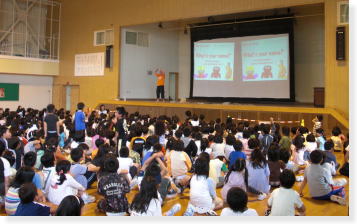
Wow, yesterday’s post on the
“bad kids at the back” and the proximity trick certainly proved popular.
Judging by the feedback and comments I think there is one more discipline technique we need:
The Agreement.
It uses the
Pygmalion Effect which refers to the
phenomenon
in which the greater the expectation placed upon people, often children
or students and employees, the better they perform.
But first let me tell you a story from my own school days ….
My class at school was pretty well behaved really.
But one day we had a new temp French teacher.
We could just tell she didn’t have confidence.
So what did some kids do?
They pushed the boundaries to see what they could get away with.
What did she do? Nothing!
So they pushed some more and more and more.
Each time they could see they were getting at her and it just became a game to see how far they could go.
Eventually she broke down in tears and ran away. (Yep, seriously!)
It was really like seeing a bunch of wild wolves tearing away at her!
If you can sympathise with that story,
The Agreement is what you need.
It’s not all you need, but you do need it.
This one is tough for one off lessons, but if you see the kids more than once it will be revolutionary.
So here we go … Bikers & Police
Whenever humans interact there is always a, usually tacit, unspoken, agreement as to how we should behave.
For example I bet you’d behave differently to a uniformed police officer to how you would behave with a young baby.
And you’d behave differently when seeing a dodgy looking biker dude on the street compared with your best friend from college.
It’s just part of who we are.
We assess the situation, think back to how we should behave and change how we act accordingly.
Sleeping & Learning
For all its faults the school system has done a pretty good job of setting up this behaviour and expectations.
The teacher stands at the front.
The students sit quietly in rows sleeping, sorry, learning.
The problems come when this breaks down.
Either from a lack or parents, a lack or parenting or even teachers in lower grades.
They leave some kids just not knowing what is expected of them.
They have no frame of reference or experience to work from.
Or even worse they pick up the bad expectations of their peers.
How far can they go? Just what is allowed in class? What can they get away with?
Even the best classes can succumb to this as we saw above.
Luckily this also means that even the worst classes can be turned around!
 And how do we do this?
And how do we do this?
By simply setting out, before we start, the expectations of the class.
The agreement between you and them, to see what each side expects of each other.
For example the teacher will set out that they will:
Teach really cool useful stuff (either for life or for exams) in a really fun way.
Respect the kids and listen to what they have to say.
Next you set out what you expect from the kids
E.g. They will:
Act respectfully of each other and the teacher.
Always try their hardest, no matter what.
Speak up and keep trying.
For younger kids keep it really simple.
And of course for older kids it’s always best to ask them to come up with their own ideas.
You’ll get the smart kids saying “We agree to sleep and do nothing.”
So have a discussion about it! Ask them if that’s really want they want to spend their time on.
Usually though, it won’t go this far.
Most kids just want to know what to do and what is expected.
That’s all they ask for.
And if it’s not there they will always act up.
We all want, and need, boundaries so we know what behaviour to go with.
Yes they’ll still push you and push the limits, that’s what kids do.
But just stand firm and stick to the agreement.
And you’ll need some punishments to back you up.
Once everyone knows where they stand and it will solve, not all, but a great deal of the problems.
It sounds crazy doesn’t it?
But just like the
proximity trick it’s just these simple steps that separate the great teachers from the chaotic ones!
What I do …
Even now I always do this with every presentation I do.
And those of you who keep a sharp eye on the blog will have noticed
than whenever I forget then that’s when things go pear shaped!
You can even
make your students smarter by expecting them to be!
I expect all of you to listen to what I say, but not believe it till you’ve tried it.
And I hope you always expect me to always try my best to help you
reduce the stress levels whilst coming up with fun ideas to make your
classes better.
That’s the way we roll here.
Keep the agreement and we all win!

Be genki,
Richard
P.S. A few people have asked how you do this if you don’t speak the
kids’ language, as obviously it won’t work in English. I’d always just
get another teacher to do it for you. Or get it written up on the
board. That can be just as effective. But remember, don’t do this in
all classes. Just the ones you want to be well behaved!

 Для того, чтобы принять участие в
Для того, чтобы принять участие в  Все желающие участвовать в конкурсе должны прийти на место тестирования во время и день, объявленный заранее.
Процесс тестирования в каждом из центров начинается с общей презентации программы и проведения первого тура конкурса.
Все желающие участвовать в конкурсе должны прийти на место тестирования во время и день, объявленный заранее.
Процесс тестирования в каждом из центров начинается с общей презентации программы и проведения первого тура конкурса. После получения анкет от всех участников по каждому центру
тестирования документы третьего тура отсылаются в Вашингтон
для рассмотрения международной независимой комиссией.
Финалисты и альтернативные кандидаты программы будут определены в
апреле 2012 года. В настоящее время точное количество
финалистов и альтернативных кандидатов, которые будут определены в
этом году, неизвестно. После объявления результатов участники
программы занимаются подготовкой необходимых документов для
получения американской визы. В течение июня и июля каждый из
участников обязательно проходит программу предвыездной
ориентации (PDO), которая обычно проводится в Киеве. Финалисты программы, выбранные в апреле 2012 года, отправятся
в США в августе 2012 года, в Украину вернутся в мае-июне 2013 года.
После получения анкет от всех участников по каждому центру
тестирования документы третьего тура отсылаются в Вашингтон
для рассмотрения международной независимой комиссией.
Финалисты и альтернативные кандидаты программы будут определены в
апреле 2012 года. В настоящее время точное количество
финалистов и альтернативных кандидатов, которые будут определены в
этом году, неизвестно. После объявления результатов участники
программы занимаются подготовкой необходимых документов для
получения американской визы. В течение июня и июля каждый из
участников обязательно проходит программу предвыездной
ориентации (PDO), которая обычно проводится в Киеве. Финалисты программы, выбранные в апреле 2012 года, отправятся
в США в августе 2012 года, в Украину вернутся в мае-июне 2013 года.
 We’ve had plenty of
We’ve had plenty of 
